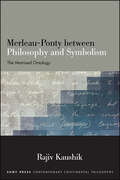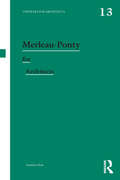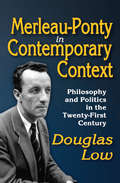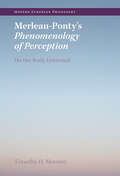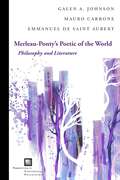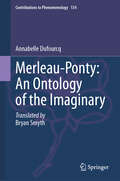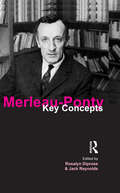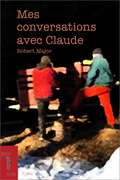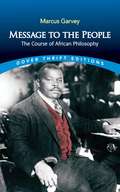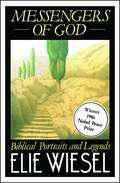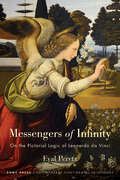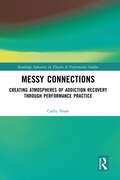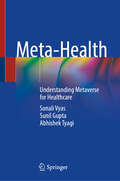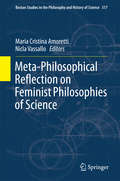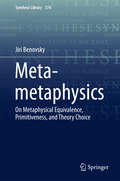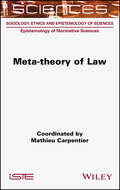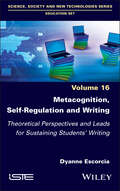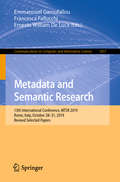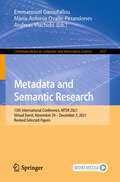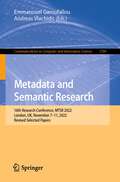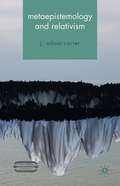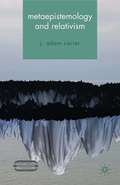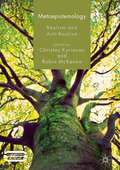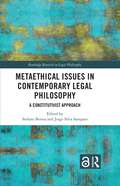- Table View
- List View
Merleau-Ponty between Philosophy and Symbolism: The Matrixed Ontology (SUNY series in Contemporary Continental Philosophy)
by Rajiv KaushikMerleau-Ponty says in his Institution and Passivity lectures that he wants to "consider criticism itself as a symbolic form" instead of doing "a philosophy of symbolic form." This invites the possibility of an unconventional thought: If critical philosophy is a symbolic form, it cannot disclose its own limits and is, in fact, uncritical. Furthermore, the symbolic form can never itself be thought according to the terms of the criticism it produces but is always only constellated and matrixed within them—a symbolic form within both reflection and what it reflects on, within consciousness and the world. Thus, as Rajiv Kaushik argues, the symbolic form is another name for what Merleau-Ponty calls ontological divergence. Only now divergence introduces the question of a limit to both the subject and philosophy itself. This is nothing less than a psychoanalysis of philosophy.Kaushik's analyses of the matrices between space—imagination, light—dark, awake—asleep, and repression—expression reveal this symbolism in its form of divergence, its lack of origin and destination. Kaushik also argues that the phenomenology of symbolism must detour from the purely descriptive method. Drawing from Merleau-Ponty's recently published course materials, and attentive to his reliance on literature and literary language, Merleau-Ponty between Philosophy and Symbolism continues the living force of Merleau-Ponty's thought and develops his radical insight of the primacy of the symbolic form, even in an ontology that claims to be about the sensible and its elements.
Merleau-Ponty for Architects (Thinkers for Architects)
by Jonathan HaleThe philosophy of Maurice Merleau-Ponty (1908–1961) has influenced the design work of architects as diverse as Steven Holl and Peter Zumthor, as well as informing renowned schools of architectural theory, notably those around Dalibor Vesely at Cambridge, Kenneth Frampton, David Leatherbarrow and Alberto Pérez-Gómez in North America and Juhani Pallasmaa in Finland. Merleau-Ponty suggested that the value of people’s experience of the world gained through their immediate bodily engagement with it remains greater than the value of understanding gleaned through abstract mathematical, scientific or technological systems. This book summarizes what Merleau-Ponty’s philosophy has to offer specifically for architects. It locates architectural thinking in the context of his work, placing it in relation to themes such as space, movement, materiality and creativity, introduces key texts, helps decode difficult terms and provides quick reference for further reading.
Merleau-Ponty in Contemporary Context: Philosophy and Politics in the Twenty-First Century
by Douglas LowThis volume presents the work of Maurice Merleau-Ponty, a great philosopher and social theorist of mid-twentieth century, as a viable alternative to both modernism and postmodernism. Douglas Low argues that Merleau-Ponty's philosophy offers explanations and solves problems that other philosophies grapple with, but do not resolve, given their respective theoretical presuppositions and assumptions. Low brings the work of Merleau-Ponty into critical contact with important thinkers, including Sartre, Heidegger, Derrida, and Marx. He highlights Merleau-Ponty's connection to the early Hegel, especially with regard to the criticism of modernism's "representational consciousness" and its subsequent skepticism with regard to our being in the world. Merleau-Ponty made a concerted effort to solve the problems that come about due to a wide variety of Western dualisms: body and mind, perception and conception, self and other, etc. He frequently does so by demonstrating the connection between these disparate terms, the connection of perception with affect and interest, fact with value, and a broadened view of science with moral and philosophical judgment. Merleau-Ponty's unique contribution is his focus on the lived-through perceiving body and its relationship to abstract thought and language. In his detailed analysis of the work of Merleau-Ponty, Low brings attention to a twentieth-century master capable of altering the landscape of modern and social philosophy in the twenty-first century.
Merleau-Ponty's Phenomenology of Perception: On the Body Informed (Modern European Philosophy)
by Timothy D. MooneyThis is an advanced introduction to and original interpretation of Merleau-Ponty's greatest work, Phenomenology of Perception. Timothy Mooney provides a clear and compelling exposition of the theory of our projective being in the world, and demonstrates as never before the centrality of the body schema in the theory. Thanks to the schema's motor intentionality our bodies inhabit and appropriate space: our postures and perceptual fields are organised schematically when we move to realise our projects. Thus our lived bodies are ineliminably expressive in being both animated and outcome oriented through-and-through. Mooney also analyses the place of the work in the modern philosophical world, showing what Merleau-Ponty takes up from the Kantian and Phenomenological traditions and what he contributes to each. Casting a fresh light on his magnum opus, this book is essential reading for all those interested in the philosophy and phenomenology of the body.
Merleau-Ponty's Poetic of the World: Philosophy and Literature (Perspectives in Continental Philosophy)
by Galen A. Johnson Mauro Carbone Emmanuel de Saint AubertMerleau-Ponty has long been known as one of the most important philosophers of aesthetics, yet most discussions of his aesthetics focus on visual art. This book corrects that balance by turning to Merleau-Ponty's extensive engagement with literature.From Proust, Merleau-Ponty developed his conception of “sensible ideas,” from Claudel, his conjoining of birth and knowledge as “co-naissance,” from Valéry came “implex” or the “animal of words” and the “chiasma of two destinies.” Literature also provokes the questions of expression, metaphor, and truth and the meaning of a Merleau-Pontian poetics.The poetic of Merleau-Ponty is, the book argues, a poetic of the flesh, a poetic of mystery, and a poetic of the visible in its relation to the invisible. Ultimately, theoretical figures or “figuratives” that appear at the threshold between philosophy and literature enable the possibility of a new ontology. What is at stake is the very meaning of philosophy itself and its mode of expression.
Merleau-Ponty: An Ontology of the Imaginary (Contributions to Phenomenology #134)
by Annabelle DufourcqThis study brings to light the original concept of the imaginary that emerges from Merleau Ponty’s thought. It elucidates the main influences that contributed to shaping Merleau-Ponty’s theory of the imaginary and aims to show that this novel concept constitutes one of the most crucial yet challenging keys to his philosophy and ultimately his ontology. This book develops the ontology of the imagery sketched by Merleau-Ponty and examines its practical implications. As its originally ambiguous and inseparable underside, the imaginary is just as central to Merleau-Ponty’s philosophy as perception. The author argues to enlarge the notion of reality by recognizing the imaginary dimension and “texture” of the real, and that Merleau-Ponty’s ontology of the flesh cannot be separated from an ontology of the imaginary. This monograph examines Merleau-Ponty’s conception of the imaginary against both his aesthetics, and his political philosophy – and appeals to students and researchers working in phenomenology and continental philosophy.
Merleau-Ponty: Key Concepts (Key Concepts #32)
by Jack Reynolds Rosalyn DiproseHaving initially not had the attention of Sartre or Heidegger, Merleau-Ponty's work is arguably now more widely influential than either of his two contemporaries. "Merleau-Ponty: Key Concepts" presents an accessible guide to the core ideas which structure Merleau-Ponty's thinking as well as to his influences and the value of his ideas to a wide range of disciplines. The first section of the book presents the context of Merleau-Ponty's thinking, the major debates of his time, particularly existentialism, phenomenology, the history of philosophy and the philosophy of history and society. The second section outlines his major contributions and conceptual innovations. The final section focuses upon how his work has been taken up in other fields besides philosophy, notably in sociology, cognitive science, health studies, feminism and race theory.
Mes conversations avec Claude (Philosophica)
by Robert MajorClaude était éminemment habile à converser. Car il écoutait. Il écoutait attentivement et pesamment. Il jaugeait les paroles qu’il entendait, et réfléchissait longuement avant de hasarder une réponse. Si longuement que le narrateur en est perplexe, au début. De toute évidence, il n’était pas de ces gens qui, selon La Bruyère, « parlent un moment avant que d’avoir pensé ». Il y a donc un paradoxe : un livre de conversations avec quelqu’un qui ne parlait guère! Pourtant, malgré tout, des liens se sont noués. Il y a eu rencontre de ces êtres, qui sont sans doute, au départ tout au moins, un dilemme l’un pour l’autre : d’un côté un quasi analphabète, mais homme sage; d’autre part un universitaire, littéraire en plus, prolixe par déformation professionnelle… Le livre de dialogues a une longue et vénérable histoire. Il a eu cours, en particulier aux XVIIe et XVIIIe siècles, mais on peut retracer son origine jusqu’aux dialogues platoniques, mettant en scène Socrate et divers interlocuteurs. Certes, ce petit livre n’a pas la prétention de s’insérer dans la prestigieuse série des dialogues illustrée entre autres par Platon, Sénèque, Diderot, Fontenelle, David Hume, voire Marguerite de Navarre ou encore Voltaire, celui-ci sur un mode satirique. Tout simplement, il fait état d’une rencontre. Publié en français
Message to the People: The Course of African Philosophy (Dover Thrift Editions: Black History #No. 7)
by Marcus GarveyIn 1937, Marcus Garvey, founder of the Universal Negro Improvement Association and one of the most controversial figures in the history of race relations, assembled his most trusted organizers to impart his life's lessons. For one month he instructed this elite student body — at its peak the largest international mass movement of African peoples — on topics ranging from universal knowledge and how to attain it to leadership, character, God, and the social system. A crucial guide to the understanding of Garvey's philosophy and teachings, Message to the People features profound insights into the nascent days of the Civil Rights movement. This volume will prove an enlightening companion to students of African American and twentieth-century history.
Messengers of God: A True Story of Angelic Presence and the Return to
by Elie WieselElie Wiesel’s classic look at Job and seven other Biblical characters as they grapple with their relationship with God and the question of his justice.“Wiesel has never allowed himself to be diverted from the role of witness for the martyred Jews and survivors of the Holocaust, and by extension for all those who through the centuries have asked Job's question: ‘What is God doing and where is His justice?’ Here in a masterful series of mythic portraits, drawing upon Bible tales and the Midrashim (a body of commentary), Wiesel explores ‘the distant and haunting figures that molded him’: Adam, Cain and Abel, Abraham and Isaac, Jacob, Joseph, and Job. With the dramatic invention of a Father Mapple and the exquisite care of a Talmudic scholar, Wiesel interprets the wellsprings of Jewish religious tradition as the many faces of man’s greatness facing the inexplicable. In an intimate relationship with God it is possible to complain, to demand. Adam and Eve in sinning “cried out” against the injustice of their entrapment; Cain assaulted God rather than his brother; and Abraham's agreement to sacrifice his son placed the burden of guilt on Him who demanded it. As for Job, Wiesel concludes that he abdicated his defiance as did the confessing Communists of Stalin’s time to ‘underline the implausibility’ of his trial, and thus become the accuser. Wiesel’s concern with the imponderables of fate seems to move from strength to strength” (Kirkus Reviews).
Messengers of Infinity: On the Pictorial Logic of Leonardo da Vinci (SUNY series in Contemporary Continental Philosophy)
by Eyal PeretzThe first philosophical engagement with the pictorial work of Leonardo, seen as a systematic whole.Presented here is the first philosophical engagement with the pictorial work of Leonardo, seen as a systematic whole. It is not written from the point of view of an art historian, even as it tries to benefit from art historical insights and procedures, but that of contemporary continental philosophy and theories of modern artistic media. Author Eyal Peretz's main objective is to understand the historical and logical place Leonardo's paintings occupy in the transition from the age of medieval sacred images to Renaissance or early modern painting. Leonardo, Peretz argues, introduced a media revolution, which has still not been fully assimilated and understood. His "modernity" is still ahead of us. Written in a clear and engaging style, Messengers of Infinity, will appeal equally to Leonardo experts, experts in continental philosophy, and those who are experts in neither of these fields but have an intellectual curiosity about the historical and conceptual significance of Leonardo in particular and of modern painting in general.
Messy Connections: Creating Atmospheres of Addiction Recovery Through Performance Practice (ISSN)
by Cathy SloanThis book examines performance practices that involve people in recovery from addiction, theorising such practices as recovery-engaged.Focusing on examples of practice from a growing movement of UK-based recovery arts practitioners and performers, it highlights a unique approach to performance that infuses an understanding of lived experiences of addiction and recovery with creative practice. It offers a philosophy of being in recovery that understands lived experience, and performance practice, as a dynamic system of interrelations with the human and nonhuman elements that make up the societal settings in which recovery communities struggle to exist. It thereby frames the process of recovery, and recovery-engaged performance, as an affective ecology – a system of messy connections. Building upon ideas from posthumanist research on addiction, cultural theory on identity and new materialist interpretations of performance practice, it considers how such contemporary theory might offer additional ways of thinking and doing arts practice with people affected by addiction. The discussion highlights the distinct aesthetics, ethics and politics of this area of performance practice.This study will be of great interest to students and scholars in Applied Theatre and Critical Arts and Mental Health studies.
Meta-Health: Understanding Metaverse for Healthcare
by Sunil Gupta Sonali Vyas Abhishek TyagiMetaverse is an emerging trend these days. It reflects in every field, like education, entertainment, business, and even healthcare. As we can experience, the Healthcare industry is constantly transforming due to emerge of new trends and technologies like moving from X-Rays to digital reports and from telehealth to Virtual Reality. It is a vast digital shift from regular practices to innovative techniques for efficient healthcare services. Metaverse plays a significant role in changing healthcare because it connects innovative technologies like Artificial Intelligence, Virtual Reality, Augmented Reality, IoT, Web 3.0, Quantum Computing, Robotics, etc. This book discusses the application area of utilizing Metaverse in Healthcare services. It focuses on various research trends and technologies related to implementing a metaverse in healthcare systems. It also covers challenges, emerging trends and techniques, and future directions for meta-healthcare systems.
Meta-Philosophical Reflection on Feminist Philosophies of Science
by Maria Cristina Amoretti Nicla VassalloThis volume offers a meta-philosophical reflection on feminist philosophies of science. It emphasizes and discusses both the connections and differences between "traditional" philosophies of science and feminist philosophies of science. The collection systematically analyses feminist contributions to the various philosophies of specific sciences. Each chapter is devoted to a specific area of philosophy of science: general philosophy of science, philosophy of biology, philosophy of climate sciences, philosophy of cognitive sciences and neurosciences, philosophy of economics, philosophy of history and archaeology, philosophy of logic and mathematics, philosophy of medicine, philosophy of psychology, philosophy of physics, and philosophy of social sciences. Since some of these areas have so far rarely been addressed by feminist philosophers, this new collection provides new angels and stimulates the debate on pivotal issues that are part and parcel of both "traditional" philosophies of science and feminist philosophies of science. Using a range of different methodologies and styles, the essays all show great clarity in both arguments and contents.
Meta-metaphysics
by Jiri BenovskyMetaphysical theories are beautiful. At the end of this book, Jiri Benovsky defends the view that metaphysical theories possess aesthetic properties and that these play a crucial role when it comes to theory evaluation and theory choice. Before we get there, the philosophical path the author proposes to follow starts with three discussions of metaphysical equivalence. Benovsky argues that there are cases of metaphysical equivalence, cases of partial metaphysical equivalence, as well as interesting cases of theories that are not equivalent. Thus, claims of metaphysical equivalence can only be raised locally. The slogan is: the best way to do meta-metaphysics is to do first-level metaphysics. To do this work, Benovsky focuses on the nature of primitives and on the role they play in each of the theories involved. He emphasizes the utmost importance of primitives in the construction of metaphysical theories and in the subsequent evaluation of them. He then raises the simple but complicated question: how to make a choice between competing metaphysical theories? If two theories are equivalent, then perhaps we do not need to make a choice. But what about all the other cases of non-equivalent "equally good" theories? Benovsky uses some of the theories discussed in the first part of the book as examples and examines some traditional meta-theoretical criteria for theory choice (various kinds of simplicity, compatibility with physics, compatibility with intuitions, explanatory power, internal consistency,. . . ) only to show that they do not allow us to make a choice. But if the standard meta-theoretical criteria cannot help us in deciding between competing non-equivalent metaphysical theories, how then shall we make that choice? This is where Benovsky argues that metaphysical theories possess aesthetic properties - grounded in non-aesthetic properties - and that these play a crucial role in theory choice and evaluation. This view, as well as all the meta-metaphysical considerations discussed throughout the book, then naturally lead the author to a form of anti-realism, and at the end of the journey he offers reasons to think better of the kind of anti-realist view he proposes to embrace. www. jiribenovsky. org
Meta-metaphysics: On Metaphysical Equivalence, Primitiveness, and Theory Choice (Synthese Library #374)
by Jiri BenovskyMetaphysical theories are beautiful. At the end of this book, Jiri Benovsky defends the view that metaphysical theories possess aesthetic properties and that these play a crucial role when it comes to theory evaluation and theory choice.Before we get there, the philosophical path the author proposes to follow starts with three discussions of metaphysical equivalence. Benovsky argues that there are cases of metaphysical equivalence, cases of partial metaphysical equivalence, as well as interesting cases of theories that are not equivalent. Thus, claims of metaphysical equivalence can only be raised locally. The slogan is: the best way to do meta-metaphysics is to do first-level metaphysics.To do this work, Benovsky focuses on the nature of primitives and on the role they play in each of the theories involved. He emphasizes the utmost importance of primitives in the construction of metaphysical theories and in the subsequent evaluation of them.He then raises the simple but complicated question: how to make a choice between competing metaphysical theories? If two theories are equivalent, then perhaps we do not need to make a choice. But what about all the other cases of non-equivalent "equally good" theories? Benovsky uses some of the theories discussed in the first part of the book as examples and examines some traditional meta-theoretical criteria for theory choice (various kinds of simplicity, compatibility with physics, compatibility with intuitions, explanatory power, internal consistency,...) only to show that they do not allow us to make a choice.But if the standard meta-theoretical criteria cannot help us in deciding between competing non-equivalent metaphysical theories, how then shall we make that choice? This is where Benovsky argues that metaphysical theories possess aesthetic properties – grounded in non-aesthetic properties – and that these play a crucial role in theory choice and evaluation. This view, as well as all the meta-metaphysical considerations discussed throughout the book, then naturally lead the author to a form of anti-realism, and at the end of the journey he offers reasons to think better of the kind of anti-realist view he proposes to embrace.www.jiribenovsky.org
Meta-theory of Law
by Mathieu CarpentierThis book is devoted to the theory of legal theory, also referred to as the "meta-theory of law".The aim of this emerging discipline is to determine the objectives, aims and methods of legal theory, and to establish the conditions of possibility as well as the validity criteria for theoretical discourse on law. The contributions in this book provide an overview of these aspects through different perspectives and approaches.The very purpose of legal theory has been disputed and the subject area is currently subject to increasing cross-fertilization between different, and sometimes diverging, traditions. Meta-theory of Law assesses these emerging trends by questioning two basic objects of legal theory, the "nature" and the "science" of law.
Metacognition, Self-Regulation and Writing: Theoretical Perspectives and Leads for Sustaining Students' Writing
by Dyanne EscorciaStudents' difficulties in producing texts that meet the requirements of academic writing are a recurring concern for teaching staff and those responsible for university courses. Various initiatives are currently being taken, mainly at undergraduate level, to help students improve the quality of their writing. Research into metacognitive processes and the self-regulation of learning can be used to support the design of these writing support systems, particularly by providing a better understanding of the students' difficulties. This book reviews the concepts of metacognition and self-regulation in relation to writing processes. It analyses the metacognitive components involved in text production, their links with successful writing and their individual and contextual determinants. It completes this analysis by drawing on the teaching and assessment of writing in higher education. All of these elements are articulated around a multifactorial modeling of the learning and teaching of academic writing.
Metadata and Semantic Research: 13th International Conference, MTSR 2019, Rome, Italy, October 28–31, 2019, Revised Selected Papers (Communications in Computer and Information Science #1057)
by Emmanouel Garoufallou Francesca Fallucchi Ernesto William De LucaThis book constitutes the thoroughly refereed proceedings of the 13th International Conference on Metadata and Semantic Research, MTSR 2019, held in Rome, Italy, in October 2019. The 27 full and 15 short papers presented were carefully reviewed and selected from 96 submissions. The papers are organized in the following tracks: metadata and semantics for digital libraries, information retrieval, big, linked, social and open data; metadata and semantics for agriculture, food, and environment; digital humanities and digital curation; cultural collections and applications; european and national projects; metadata, identifiers and semantics in decentralized applications, blockchains and P2P systems.
Metadata and Semantic Research: 15th International Conference, MTSR 2021, Virtual Event, November 29 – December 3, 2021, Revised Selected Papers (Communications in Computer and Information Science #1537)
by Emmanouel Garoufallou María-Antonia Ovalle-Perandones Andreas VlachidisThis book constitutes the thoroughly refereed proceedings of the 15th International Conference on Metadata and Semantic Research, MTSR 2021, held as a virtual event in November-December 2021. The 27 full and 7 short papers presented were carefully reviewed and selected from 92 submissions. The papers are organized in the following topical sections: metadata, linked data, semantics and ontologies - general session, and track on agriculture, food and environment; track on open repositories, research information systems and data infrastructures; track on knowledge IT artifacts (KITA) and decentralized applications, blockchains and P2P systems, and general session; track on digital humanities and digital curation, and general session; track on digital libraries, information retrieval, big, linked, social and open data; track on european and national projects, and general session; track on cultural collections and applications, and general session.
Metadata and Semantic Research: 16th Research Conference, MTSR 2022, London, UK, November 7–11, 2022, Revised Selected Papers (Communications in Computer and Information Science #1789)
by Emmanouel Garoufallou Andreas VlachidisThis book constitutes the refereed post proceedings of the 16th Research Conference onMetadata and Semantic Research, MTSR 2022, held in London, UK, during November 7–11, 2022.The 21 full papers and 4 short papers included in this book were carefully reviewed andselected from 79 submissions. They were organized in topical sections as follows: metadata, linked data, semantics and ontologies - general session, and track on Knowledge IT Artifacts (KITA), Track on digital humanities and digital curation, and track on cultural collections and applications, track on digital libraries, information retrieval, big, linked, social & open data, and metadata, linked data, semantics and ontologies - general session, track on agriculture, food & environment, and metadata, linked Data, semantics and ontologies - general, track on open repositories, research information systems & data infrastructures, and metadata, linked data, semantics and ontologies - general, metadata, linked data, semantics and ontologies - general session, and track on european and national projects.
Metaepistemology and Relativism (Palgrave Innovations in Philosophy)
by J. Adam CarterMetaepistemology and Relativism.
Metaepistemology and Relativism (Palgrave Innovations in Philosophy)
by J. CarterIs knowledge relative? Many academics across the humanities say that it is. However those who work in mainstream epistemology generally consider that it is not. Metaepistemology and Relativism questions whether the kind of anti-relativistic background that underlies typical projects in mainstream epistemology can on closer inspection be vindicated.
Metaepistemology: Realism And Anti-realism (Palgrave Innovations in Philosophy Ser.)
by Christos Kyriacou Robin McKennaThis book contains twelve chapters by leading and up-and-coming philosophers on metaepistemology, that is, on the nature, existence and authority of epistemic facts. One of the central divides in metaepistemology is between epistemic realists and epistemic anti-realists. Epistemic realists think that epistemic facts (such as the fact that you ought to believe what your evidence supports) exist independently of human judgements and practices, and that they have authority over our judgements and practices. Epistemic anti-realists think that, if epistemic facts exist at all, they are grounded in human judgements and practices, and gain any authority they have from our judgements and practices. This book considers both epistemic realist and anti-realist perspectives, as well as perspectives that 'transcend' the realism/anti-realism dichotomy. As such, it constitutes the 'state of the art' with regard to metaepistemology, and will shape the debate in years to come.
Metaethical Issues in Contemporary Legal Philosophy: A Constitutivist Approach (Routledge Research in Legal Philosophy)
by Jorge Silva Sampaio Stefano BerteaThis volume explores the importance of constitutivism for legal studies. Constitutivism is the view that the normative force, or authority, of practical reasons is grounded in principles, capacities, aims, or functions that are essential to, and thus constitutive of, agency. While the implications that the constitutivist approach has on the fundamental metaethical disputes and central ethical debates have been extensively explored, the literature on the relations between constitutivism and law remains scarce, unsystematic, and sporadic. This collection brings together world-renowned practical philosophers and legal theorists to fill a noticeable gap in the literature. The authors systematically and innovatively address key dimensions of the relationships between constitutivism and the theoretical study of law, as well as programmatically offering novel insights into the conceptual connections between constitutivist claims, fundamental legal concepts and practices, legal issues, and, ultimately, the law as a distinctive concept. The book will be of interest to academics and researchers working in the areas of Legal Philosophy, Legal Theory, Jurisprudence, Moral Philosophy and Metaethics.Chapter 8 of this book is freely available as a downloadable Open Access PDF at http://www.taylor-francis.com under a Creative Commons Attribution-Non Commercial-No Derivatives (CC-BY-NC-ND) 4.0 license.
